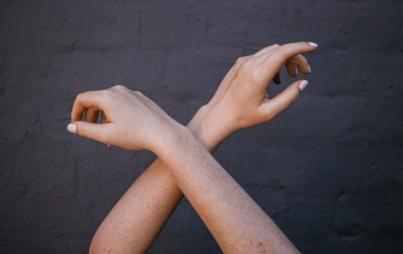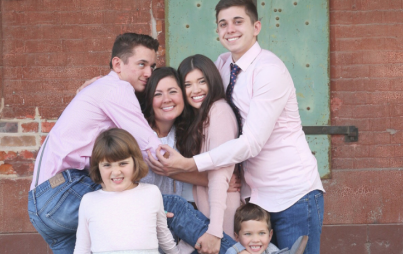
Letting go of suicide means I have to let it all go, let it all out.
Dear Suicide,
I don't know how to start this. I want to write something deep and life-changing, but that's just too daunting. So I'll start with the facts before I have to do the hard part of breaking up with you.
I always wonder if I am making all of this up. I think about suicide a lot, and these thoughts never register as important. I don't feel anything when I think about suicide. It doesn't feel real. If it doesn't feel real, then am I just having these thoughts because I want attention? Why would I feel nothing and also be suicidal? When people ask if I've made an attempt, it almost seems ridiculous they would ask. It's not a big deal. It's just something I do. Suicide has simply become part of the fabric of my worldview.
Letting go of suicide means I have to let it all go, let it all out. This means acknowledging all the other painful losses I have yet to face — loss of my innocence, agency, hope, dreams, and years of my life.
I worry that being suicidal without feeling any emotion negates the meaning behind my actions and thoughts, because how could someone want to die and feel nothing? Yet, I remember feeling pain — deep, dark emotional pain — when I poured hot water on my arm, put a bag over my head and took too much ibuprofen. Sure, none of these were lethal. Fear of dying kept me from going further. And if I was too scared to carry out a suicide plan, then maybe the pain behind those actions isn't valid somehow. I'm getting tangled up and confused again.
Why is it so important for me to know for certain whether my suicidality is valid or not, that it means something? Maybe that's the wrong question. Maybe the real issue is about whether my pain is valid or not, whether my experiences are real or not, whether the damage from years of sexual abuse left me wounded beyond recognition, left me without hope for anything other than a quick end.
I have wrapped all the parts of my past I am afraid of into suicide to avoid dealing with the overwhelming pain, violation, and loss. Now I can't distinguish between suicide and everything that's tied up in it — it's all a blur. If I let go of suicide, I would have the chance to unravel and recover from the pain instead of allowing it to hold me hostage.
It also feels like letting go of suicide means erasing my past experiences and feelings.
Large swaths of my history feature suicide. They're mistakenly tied together — to get rid of suicide is to get rid of my history. For better and worse I have many positive memories of connection, care, and love tied to suicidality, but they came at a high price, one no one should have to pay. I don't want to let these memories go. My survival still feels tied to my ability to hold it all in, hold it all together.
Letting go of suicide means I have to let it all go, let it all out. This means acknowledging all the other painful losses I have yet to face — loss of my innocence, agency, hope, dreams, and years of my life. The grief feels too big, and I can't manage the mourning process on my own. But at some point, I have to be brave and face the ugly if I ever want to move on. There just isn't another way, not even you, Suicide. I can see that now.
I've lived for so long convinced my real life is in the past — there can never be another moment like that time talking with my first real girlfriend under a tree late at night, or the feeling of joy I got playing my saxophone on a football field in marching band. Those moments belong solely in my past, never to happen again. I would do anything to go back in time and live those moments over and over. I can't. But infinity goes in both directions; nothing happens just once. What if suicide is preventing new girlfriends or new football stadiums?
What if there's a chance for more? I want to find out.
For years you have defined my life, Suicide. Every step I take, you are right there with me. You always feel like a friend, but then again, I am used to being treated like I am disposable. You made sure everybody else was shut out, just you and I isolated against the world. It used to feel safe that way, but now it's becoming lonely. I realize how many new people and opportunities you prevent me from discovering. My dysfunctional relationship with you is severely limiting my life, and I want something different.
I want to be someone powerful, someone open and alive and free. I want to be as inspired as I was as a kid, as resilient as I was at 13, as passionate as I was at 21, and as hopeful as I was at 25.
I have no plan, no blueprint, no idea where to go from here — it terrifies me.
I don't believe I have the energy, the strength or the optimism ever to dream again, to ever feel hopeful and open instead of tempered and reserved. I truly don't know I have it in me. But it's a question, and one I need to answer. I can only do that if I'm alive. It's time to redefine what I want in my life to look like — to decide what relationships I deserve — and build it from the ground up.
You and I have a long history, Suicide. There is so much more I could say. Losing you is huge, and I'm not going to pretend otherwise. But giving you up is the right thing to do, even though it feels wrong. And saying goodbye to suicide this way, I set the terms — this is my decision, my life, and my power.
Thank you for the lessons you've taught me all these years.
You will always be part of my history, but this is the end of the road. Suicide is, now and forever, off the table.
Sincerely,
Renée








